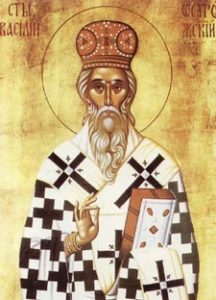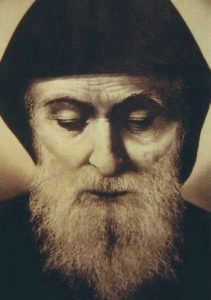The Spiritual Healing
This section aims to provide a series of guidelines for healing and emotional stabilisation from a Christian perspective. It begins with a mini-dictionary of lesser-known but essential terms for understanding the healing process.
- Atimia = decrease in affective tone and is a severe form of hypotimia that accompanies deep depression. It is an affective collapse, with sadness, discouragement, anxiety, feelings of self-depreciation, inability to feel joy, thoughts about death, easy crying, negative attitude towards the future, and rumination of bad thoughts about past personal experiences.
- Agalia – spiritual joy.
- Akedia – sadness.
- Eutimia – positive emotion, happiness
- Grejnick = sinner (Slavonic). Worries mean living in the flesh, that vulnerable and fallen part.
God is symbolised by good choices, just as the Self is symbolised by objects.
Conclusion: the one overwhelmed by worries is a sinner.
Example: the kitchen should be service, not worry – selfless work to obtain immediate personal profit, with a sense of giving, with love and without grumbling.
If you remove grumbling, obsessions, and envy, you gain the mind of service, the clear mind of goodness and health.
The principle of pleasure is related to the immediate satisfaction of certain needs. When these cannot be fulfilled, the person whines, curses, grumbles, screams.
In adults, frustration of pleasures can manifest through reverie and dreaming to obtain illusory satisfaction.
In cases of nervous disharmony, frustration of pleasures manifests through vehement claims, dissatisfaction, and anger.
- Prayer of Ephrem the Syrian:
“Lord, Heavenly King, the spirit of idleness, of excessive care, of vain speech, of domination over others, remove it from me,
But, the spirit of purity, of humble thought, of patience and love,
Grant it to me, Your servant,
Therefore, Holy King, grant me to see my mistakes and not to condemn my neighbor,
For You are blessed forever and ever.
Amen!”
- Prayer:
“Pray without ceasing, give thanks in all circumstances (1 Thessalonians 5:17-18)”
- Psalms with healing power:
Healing Psalms: Ps 23, 102 Prophylactic Psalms: Ps 6, Ps 38 (39) Penitential or purification Psalms: Ps 21, 31, 50, 141 Perfection Psalms: Ps 45, Ps 119
Why?
Gratitude is different from pleasure Gratitude is a saving state, it is emotional stability Gratitude is a very subtle state of mind, protected from affective fluctuations, from exaltation, but also from whining.
Fundamental difference between symbols (sacramentals) and diabolic actions: symbolon (=union, Gr.), and Diabolos (=division, breaking, splitting, discord, Gr.)
Sacred symbols:
Cross = symbol of salvation. Book = symbol of enlightenment.
Candle = Christic symbol, light of life.
The icon = symbol of the incarnation of the divine in history.
The mountain = symbol of faith.
Hand = symbol of healing.
The foot = symbol of service, of obedience.
Triptych cross + anchor + heart = faith, hope, and love.
Water = symbol of purification.
Bread and wine = Eucharistic symbols (we remember the symbol of bread as the body of Christ at every meal).
Trees = Jesus, heavenly happiness, resurrection of the body, the baptised person compared to the unbaptized.
Flowers = symbol of the gifts of the Holy Spirit.
Walnut = human perfection.
Metania = symbol of the resurrection of man from the death of sin (metanoia = renewal of the heart, a spiritual transformation, Gr.)
Toaca (Romanian word)= call and mediation between earth and heaven
Bell = external voice of the church.
Amen = beginning and end
References:
Andru, V. (2011). Isihastic Psychotherapy. Bucharest: Ed. Paralela 45.
Vindecare spirituala
Aceasta sectiune isi propune sa ofere o serie de repere pentru vindecare si stabilizare emotionala din perspectiva crestina. Ea debuteaza cu un mini-dictionar de termeni mai putin cunoscuti, dar esentiali pentru intelegerea procesului de vindecare.
Atimia = scaderea tonusului afectiv si este o forma severa de hipotimie si insoteste depresia profunda. Este o prabusire afectiva, cu intristare, descurajare, stari de anxietate, sentimente de autodepreciere, incapacitate de bucurie, ganduri despre moarte, plans facil, atitudine negativa fata de viitor, rumegare de ganduri rele despre experiente personale trecute.
- Agalia- voioisie duhovniceasca
- Akedia- intristare
- Eutimia- emotie pozitiva, fericire
- Grejnick = pacatos (Slavona). Grijile inseamna a trai in trup, acea parte vulnerabila si cazatoare.
Dumnezeu este simbolizat prin alegerile bune, dupa cum Eul este simbolizat prin obiecte.
Concluzie: cel coplesit de griji este un pacatos.
Exemplu: bucataria ar trebui sa fie slujire nu grija- munca dezinteresata de a obtine profit personal imediat, cu simtul daruirii, cu drag si fara bombaneli.
Daca inlaturi bombaneala, obsesiile si invidia capeti mintea slujirii, mintea limpede a bunatatii si a sanatatii.
Principiul placerii este legat de satisfacerea imediata a unor trebuinte. cand acestea nu pot fi indeplinite omul scanceste, injura, bombaneste, urla.
La adult frustrarea de placeri se poate manifesta prin reverie si vis pentru a obtine satisfacerea iluzorie.
In cazuri de dizarmonie nervoasa, frustrarea de placeri se manifesta prin revendicari vehemente, nemultumiri si manie.
- Rugaciunea lui Efrem Sirul:
“Doamne, Imparate Ceresc, duhul tandaviei, al grijii de multe, al grairii in desert, al stapanirii peste altii, departeaza-l de la mine,
Dar, duhul curatiei, al gandului smerit, al rabdarii si al dragostei,
Daruieste-mi-l mie, robul Tau,
Asadar, Sfinte Imparate, daruieste-mi sa vad greselile mele si sa nu osandesc pe aproapele meu,
Ca binecuvantat esti in vecii vecilor.
Amin!”
2. Rugaciunea:
“Rugati-va neincetat, intru toate multumiti (1Tes, 5:17-18)”
Psalmii cu putere vindecatoare:
- Psalmii insanatosirii: Ps 23 , 102
- Psalmii profilactici: Ps 6, Ps 38 (39)
- Psalmii penitentei sau purificarii: Ps 21, 31, 50, 141
- Psalmii desavarsirii: Ps 45, Ps 119
De ce?
- Multumirea este diferita de placere
- Multumirea este o stare salvatoare, este stabilitate emotionala
- Multumirea este un stadiu al mintii foarte subtil, ferit de fluctuatii afective, de exaltare, dar si de scanceala.
3. Diferenta fundamentala dintre simboluri (sacramentalii) si actiuni diabolice: symbolon (=unire, Gr.), iar Diabolos (=dezbinare, rupere, scindare, invrajbire, Gr.)
4. Sacramentalii:
- crucea= simbolul mantuirii
- carte- simbolul iluminarii
- lumanarea- simbolul hristic, lumina vietii
- icoana- simbolul intruparii divinului in istorie
- muntele- simbolul credintei
- mana- simbolul vindecarii
- piciorul- simbolul slujirii, al ascultarii
- tripticul cruce+ancora+inima – credinta, nadejdie si dragoste
- apa- simbolul purificarii
- painea si vinul- simboluri euharistice (rememoram simbolul painii ca trup hristic la fiecare masa
- arborii- Isus, fericirea cereasca, invierea corpului, omul botezat fata de cel nebotezat
- florile- simbolul harurilor Sf Duh
- nuca- perfectiunea omeneasca
- metania- simbolul invierii omului din moartea pacatului (metanoia = reinnoirea inimii, o transformare spirituala, Gr.)
- toaca – chemare si mediere pamant- cer
- clopotul- vocea exterioara a bisericii
- amin- inceputul si sfarsitul
Referinte:
Andru, V (2011) Psihoterapie isihasta. Bucuresti: Ed. Paralela 45.
Wonderworker' Saints

St Basil of Ostrog
(The icon is from https://www.oca.org/saints/lives website)
Prayer for intercession of St Basil of Ostrog
O Holy father Basil, God-pleaser and Wonderworker of Ostrog, you who even during your earthly life took care of your spiritual flock and interceeded for them before the Throne of The Most High!
Look also upon us living in strange lands, far away from the land of our fathers, pray for us and guide us that we may never stray from the path of our Lord, and Saviour Jesus Christ, wherever we may be.
Entreat Him to grant us forgiveness of our many sins, and transgressions, to straighten our steps and to endow us with the gift of faith, hope and love, that we may one day find Life Eternal, along with the choirs of our holy forefathers of Heavenly Serbia.
Holy Hierarch Basil, Wonderworker of Ostrog, pray to God for us!
(from https://orthochristian.com)

St Charbel ( Youssef Antoun Makhlouf)
(The icon is from Charbel Makhlouf – Wikipedia website)
The Novena for intercession of St Charbel
The Opening Prayer
I bow before You with this prayer, Almighty God, full of mercy and love. I thank You with all my heart for everything You have done for me through Saint Charbel’s intercession.
I am forever grateful to you, Saint Charbel. I cannot find the right words to thank you for all that you have done for me. Help me to always be worthy of God’s grace and to deserve Your protection.
Our Father, Hail Mary, Glory be to the Father…